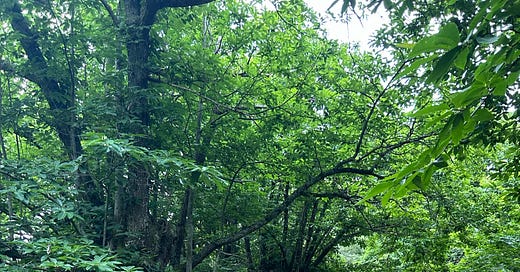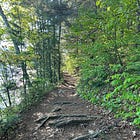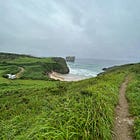Walking the Camino (Part 2): One Foot Well Planted
This is the final part of my extraordinary interview with Éric Hébert-Daly, who walked the Camino de Santiago (and a few others) this summer. Check it out! And today's Nudge: Hope, Then and Now.
Hope, Then and Now
Hope seems to be in short supply these days. In our time of climate crisis, when the numbers don’t lie and instead prove themselves in the punishing storms of Hurricane Helene and Milton, it can be hard to find hope.
Yet, I get asked about hope every week. After all, as an ordained minister hope is my stock in trade! And as a climate chaplain, I know that hope in our time of climate emergency is what so many people are seeking.
The struggle to find hope in times of uncertainty isn’t new. While the climate and ecological crisis is new to humanity - it is an existential crisis of a scale and scope the human community has never seen before - the struggle to find or experience hope is an ongoing one.
We are in a climate and ecological crisis, and it’s all hands on deck... Subscribe to join a community of people of faith who care about climate action and find hope and encouragement at the same time!
In my conversation with my friend Éric on his recent pilgrimage along the Camino de Santiago, he shared with me the ancient history of the Camino. Pilgrims have been walking the Camino for at least 1000 years! People have been seeking hope along the path of the Camino for a very long time. Take a look at this photo, taken and shared with me by Éric:
This is a photo of ancient chestnut trees in the Picos de Europa along the Camino Lebaniego. They are more than 1000 years old! This particular camino is about 600 years old (in last week’s interview with Éric, he explained that there are a lot of smaller caminos, or paths, as part of the Camino de Santiago).
Beside those chestnut trees is a path long worn smooth with the feet of people seeking hope. For hundreds of years, people have taken their various feelings for and about hope and walked. They have searched for hope; have felt hopeless, or perhaps felt hopeful for what they would find along the way. Perhaps they would stop when the walnuts were ripe, and eat their fill, nourishing themselves in their search for hope. Whatever the pilgrims were hoping for, they didn’t stand still. They walked, putting one foot in front of the other. Their walking was itself an act of hope.
Although the time we’re in now is one the early pilgrims couldn’t have known, they would have known the many feelings surrounding hope and hopelessness that people are experiencing in this time of climate crisis. That perhaps you are feeling now. Today, as your Friday Nudge, I invite you to gaze at the photo of the ancient walnut trees along the Camino Lebaniego. Take some deep breaths, say a short prayer, and then ask God, “What act of hope do I need to take today? How can I put one foot in front of the other in hope for a better world?”
Speaking about Hope
I’ve been asked to talk about hope by a local environmental organization. CAFES Ottawa is a network of local environmental and climate leaders in the city of Ottawa; they are a civil society organization that invites various people into conversations to engage and empower citizens to take action where they live.
One of those conversations will be on Tuesday, October 22 at Manotick United Church. I’ll be joined by Mike Fletcher, an energy transition consultant. Together we’ll talk about what hope means and can look like in our time of climate crisis. If you live in the area, please join us!
Walking the Camino (Part 2): One Foot Well Planted
An Interview with the Rev. Éric Hébert-Daly
Éric is the Executive Minister for the Eastern Ontario Outaouais, Nakonha:ka and East Central Ontario regional councils of the United Church of Canada. He and I have been friends for more than 10 years, and share many things in common, including our Acadian French heritage and love for the natural world. I was thrilled when he agreed to sit down with me before, and after, the journey he was about to take on the Camino.
If you didn’t read it, here is our conversation before he left:
After his return Éric and I had a wonderful conversation! Last week I shared the first part of our conversation, in which we hear about how far he walked, his experience of God during that time, and the surprising learning he gained. Here it is:
In this final part of our interview, we learn about Éric’s encounters with the natural world and how he relates his experience walking the Camino to the need for climate action. Enjoy!
Jessica: I'm hearing in what you've said already things that surprised you. What was really difficult?
Éric: About a week in the first week of that particular journey had a lot of mountains. A lot of thousand-meter climbs, and a lot of descents, which turns out descents are a lot harder than climbs. And there was one day when it had been raining the whole day, and there were lots of climbs in the mud.
And in fact, this is the day I thought of you. Because what made the mountain climb on this particular day muddy in [this] case was because it was an area of forestry activity. They’re cutting down trees and it made the path almost unpassable. And I thought, ‘hand it to a forestry company to destroy sacred space.’
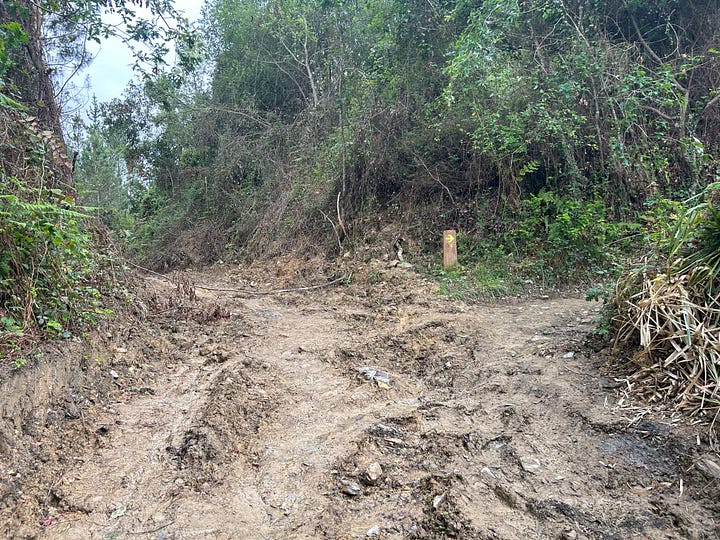
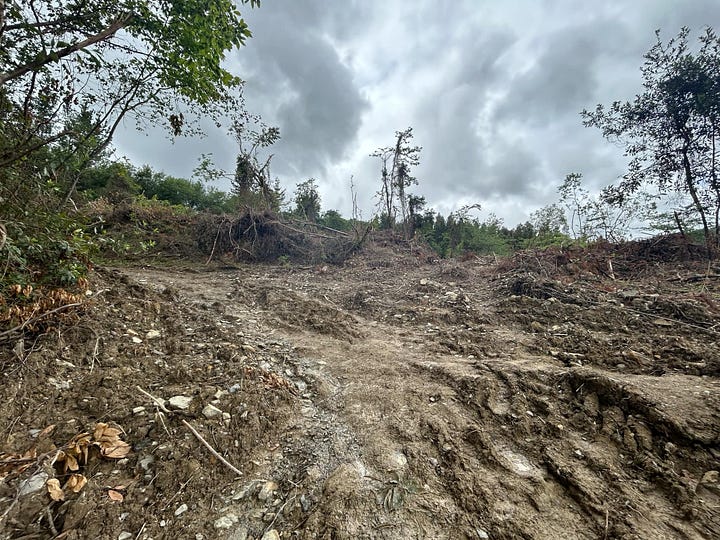
It was raining and the mud was thick and you would take one step and slide halfway back. It was just that kind of trudging through. And I knew that I was only a couple of kilometres away from the albergue so I just powered through. And it was the one time I fell. Thankfully I fell into the forest and not right in the mud.
Jessica: Insult to injury.
Éric: But I made it to the albergue and the albergue was full.
And I had already walked 25 kilometres in not-so-ideal temperatures or circumstances! But I knew there was another albergue a couple of kilometres away, so I thought, Okay, no problem, I'll keep walking.
And I walked to that one, and it hadn't opened for the season. And the next one was 15 kilometres away.
Jessica: Oh my goodness!
Éric: And so I thought, Okay, I can't [walk that far]. What are my options? And I stopped and decided I was going to take a taxi back to the last city I was in. Find a hotel. Just find a way to sort of regroup.
My phone was dying. I was in the middle of nowhere and I called the taxi company and it turns out that although I speak sufficient Spanish, Euskaria is the language spoken in the Basque country, much more than Spanish. And the person spoke some Spanish, but not in a way that I could understand. I tried to explain the situation I was in to the dispatcher. And not knowing what he was saying to me, he hung up. So I called again and I said, “Sorry, I don't understand. I'm trying to make sure I have a way out.” And he started yelling at me with words I didn't understand. And then he hung up again!
And I thought, what am I doing here? My phone's dying, I have no way out of this. And then somebody called and it turned out it was the taxi driver who spoke Spanish. I could speak to him and he said, I'm on my way. Thank God! And then I regrouped.
I re-walked the most difficult section the next day and it was a little drier because it wasn't raining that morning. And I felt like I could make it through, but that was the toughest part. The rest of the time, there weren't very many challenges. The rest of it was pretty good.
Jessica: I'm thinking about the fact that our society is so ‘go, go, go.’ And so I have to ask this question: Was it ever boring?
Éric: I think you'd have to define boredom. Because I wasn't connected on social media, I wasn't, you know, looking at YouTube videos…all I did was walk, eat, journal, sleep. There were long stretches where I wasn't doing anything but boredom isn't the right word for describing what that felt like, interestingly enough. As somebody who does fill his days with things, it did not feel like boredom. It just felt like ample space.
Jessica: I love that. Ample space.
Éric: Which is what we all need.
And maybe it was just because I had determined that's what I was doing, so therefore it wasn't boredom, right? If I had decided that I was going to keep busy the whole time, then I probably would have felt bored and I probably would have been tempted to just go, Oh, never mind, I'll go onto Facebook and just burn some time or I'll go play a game on my phone and keep my mind occupied.
But I didn't want to occupy my mind.
Jessica: No Wordle for you!
Éric: No. And you know, I got rid of all the games on my phone and I did all that to sort of stay focused. And it was very much what I needed. And yeah, there were hours and hours. Sometimes I would get to a place and check in at three o'clock and have like five hours before dinner was served.
Jessica: The photos that you've posted since you got back show the incredible beauty of the natural world around you. Could you share your experience of walking in and with the natural world?
Need to find encouragement and hope in this time of climate and ecological crisis? Want to support this eco-ministry that is international and ecumenical? With a paid subscription you’ll get more of the encouragement you need, find hope in this difficult time, and make this ministry possible!
(If you’re a student or you wish you could upgrade but can’t right now, email me and I’ll comp you a one-year subscription.)
Keep reading with a 7-day free trial
Subscribe to Faith. Climate Crisis. Action. to keep reading this post and get 7 days of free access to the full post archives.


